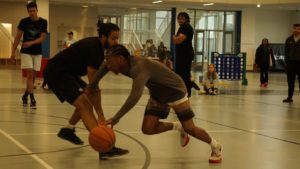After Heated Meeting, SGA Reasserts Mandatory Club Bystander Trainings
September 20, 2018
When Central Connecticut State University’s Student Government Association passed a motion to make bystander trainings mandatory for club leaders last year, the implementation of these trainings looked to be a done deal with no complaints.
However, last week’s meeting reintroduced the issue to the table when President of the Accounting Society Bruno Wieckowski expressed his disdain for the trainings during the SGA’s public hearing.
“My club will not be bullied into complying with this because I believe in practice what you preach,” Wieckowski said to the SGA. He explained that he was “appalled” at a meeting he had with SGA Vice President Dante Solano, Treasurer Kristina DeVivo and Student Life Committee Chair Jamie Carbone, calling the three “uneducated” on sexual assault.
He then claimed that DeVivo did not herself participate in the training and that Carbone admitted she was “on her phone” the entire time.
Wieckowski went on to say that he believed the trainings were redundant, citing the sexual assault trainings freshmen receive during orientation and the survey students are required to take during their first month at CCSU. He also called the excusal process “extremely convoluted” and “a bigger waste of time than the actual seminar.”
Additionally, Wieckowski demanded to know whether an incident had garnered the need for the mandatory trainings.
“I’m asking you to think if you really believe these bylaws have any integrity with how this was constructed, voted on and passed,” Wieckowski finished.
Wieckowski’s remarks were followed by comments from Armando Osario, president of the PRIDE Club and a former SGA senator. Osario acknowledged Wieckowski’s concerns on redundancy but said that “there was no accountability” during the Freshmen Orientation and online survey trainings, something that the new bystander trainings, she believed, would change.
“I personally think [the trainings are] a wonderful addition to the bylaws. I have been affected by sexual assault not only in my own life, but my friends’ lives as well,” Osario stated. Her input received applause from some senators.
The SGA’s bylaws maintain that clubs whose executive boards do not participate in the bystander training risk losing funding. The motion began in the Student Life Committee, introduced and primarily written by former chair Senator Victor Constanza. It passed the SGA in a consent agenda at last semester’s final meeting.
“‘Appalling?'” Constanza, now chair of External Affairs, said later during the SGA’s open floor debate. “I was [at the meeting with Wieckowski]. I do not agree with that. It’s the law.”
Carbone, who took over the committee, reaffirmed that she will “uphold the integrity of our bylaws” and stated that “the excusal process is still going to remain the way that it is.” She added that Wieckowski’s “good point” about redundancy mentioned would be examined further.
Moreover, she addressed Wieckowski’s claim that she had been distracted during sexual assault trainings, but clarified that she had been referring to the Freshmen Orientation training and not the new mandatory bystander trainings.
“I do know what sexual assault is and have personally been affected by it and know people who’ve been affected by it,” Carbone elaborated. “My purpose of saying what happened during freshmen year was to highlight that seminar’s ineffectiveness.”
DeVivo backed Carbone’s explanation, saying that she’d also been referencing the Freshmen Orientation training, which Wieckowski concurred.
“The reason I explained that in the meeting [with Wieckowski] was to bring up [the lack of] accountability. I gave myself as an example to show now how much of a priority it is to me that we are doing the bystander training,” DeVivo said.
The meeting finished with an overall consensus that the mandatory bystander trainings would remain as they are. However, Solano recognized the disagreement he said the SGA would inevitably continue to face about the trainings and other issues, but reminded the senators that they represent the entire student body, criticizing the clapping.
“If [Wieckowski] was still in this room, he probably would’ve found it a waste of time to come and speak to us with the reaction his speech got and the reaction that [Osario’s] speech got,” Solano stated. “Keep that in mind.”







